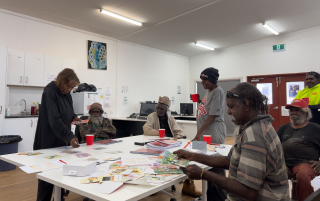I’m passing on what I have learned from UNITAR. Hopefully [the learners] will go and transfer this knowledge to other people and bring a positive change in their communities,” he says. “As an educator, I will pass on every tiny amount of information I have to make a positive impact on anyone’s life.
- Khamis first came to Hiroshima in 2019 for a UNITAR training programme on entrepreneurship and leadership. Inspired by Hiroshima’s history, he now studies post-conflict transition at Hiroshima University.
- Khamis volunteers as a coach for the UNITAR Building Bridges: Entrepreneurship and Project Planning in South Sudan Programme.
- Supported by the Government of Japan, the UNITAR programme builds the hard and soft skills of young professionals in post-conflict countries in entrepreneurship, project management, and leadership.
- Khamis is committed to passing on what he learned from UNITAR to make a positive impact on young people’s lives.
UNITAR alumnus Khamis Bol Ajak Aguar of South Sudan is passionate about sharing all he knows with young people. He believes education has the power to transform communities and build a peaceful and prosperous South Sudan.
In 2017, Khamis was invited to take part in the Young African Leaders Initiative, a programme in Nairobi started by then US President Barack Obama. Upon completing the programme, Khamis went to the University of Juba to offer his services.
“I told them, I want to teach. I don’t need payment. I had this experience; I want to pass this practical experience to these students before they graduate, so they can be ready for the market.”
The university turned him down because he didn’t have a master’s degree.
Not to be deterred, Khamis went to earn his master’s in international communication and journalism at the Communication University of China. In 2018, he returned to Juba.
Three days after arriving in South Sudan, he presented himself at the University of Juba and told them, “I’m here.”
From then, he taught at the university, right up to the day he came to Japan to start his new studies at Hiroshima University.
Finding hope for South Sudan in Hiroshima’s history
Khamis visited Hiroshima for the first time in 2019 for a , run annually since 2015. Of the topics covered, he found most memorable learning about needs assessments and effective communication skills.
When the programme took him to Hiroshima Peace Memorial Museum, he found himself feeling hopeful.
I was telling myself, Japan was here less than 80 years ago. In South Sudan, we’ve been at war for quite some time, and even after independence in 2011, we entered into civil war. But I thought, maybe transition is possible if we take what Japan did and apply [what is] suitable to South Sudan.
He is now researching post-conflict transition for his master’s degree in international peace and co-existence at Hiroshima University, with support from the Japan International Cooperation Agency (JICA) .
Giving back as a mentor
As a learner, Khamis especially enjoyed meeting his co-learners.
UNITAR gave us a chance to interact among ourselves, young South Sudanese dreaming to change their communities. Some of them were my seniors, and up to today, we are still communicating.
Khamis hopes to nurture the same kind of collegial support as a volunteer mentor and coach for the UNITAR Building Bridges: Entrepreneurship and Project Planning in South Sudan Programme. He doesn’t want the learners to feel hesitant to ask questions or make mistakes. “I tell them, ‘Don’t look at me as a coach, but look at me as a learner like you.'”
Supported by the Government of Japan, the UNITAR programme builds the hard and soft skills of young professionals in post-conflict countries in entrepreneurship, project management, and leadership. The 2021 programme ran with 76 participants between June and end of October 2021.
Looking to the future
Khamis credits UNITAR for bringing a big change to his life. “It opened so many opportunities and networks from South Sudan as well as Japan.”
After he completes his degree at Hiroshima University, Khamis will return to South Sudan to continue working as an educator. His dream is to one day open a learning centre to train/educate and empower people.
Khamis believes that the country must invest in education, especially primary education, if it is to grow. “Children [in South Sudan] do not value school or take education seriously because they do not have any role models to inspire them,” he says.
No doubt, however, that Khamis is one such role model.







